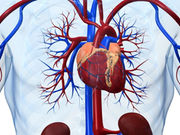Significantly lower rate of MACE for fully adherent patients versus partially adherent, nonadherent
THURSDAY, Aug. 18, 2016 (HealthDay News) — Full adherence to guideline-recommended therapies is associated with a reduced rate of major adverse cardiovascular events (MACE) and cost savings, according to a study published in the Aug. 23 issue of the Journal of the American College of Cardiology.
Sameer Bansilal, M.D., from the Icahn School of Medicine at Mount Sinai in New York City, and colleagues stratified patients hospitalized with myocardial infarction (MI) or atherosclerotic disease (ATH) as fully adherent, partially adherent, or nonadherent to statins and angiotensin-converting enzyme inhibitors. Data were included for 4,015 post-MI patients and 12,976 patients with ATH.
The researchers found that the fully adherent group had a significantly lower rate of MACE than the nonadherent and partially adherent groups in the post-MI cohort (hazard ratios, 0.73 and 0.81, respectively). For MI hospitalizations, the fully adherent group had reduced per-patient annual direct medical (ADM) costs of $369 and $440 compared with the partially and nonadherent groups, respectively. At two years, the fully adherent group had a significantly lower rate of MACE than the nonadherent and partially adherent groups (hazard ratios, 0.56 and 0.76, respectively) in the ATH cohort. Reduced per-patient ADM costs for MI hospitalizations were $371 and $907 for the fully adherent group versus the partially adherent and nonadherent groups, respectively.
“Novel approaches to improve adherence may significantly reduce cardiovascular events,” the authors write.
Several authors disclosed being employees of Ferrer and Aetna.
Full Text (subscription or payment may be required)
Editorial (subscription or payment may be required)
Copyright © 2016 HealthDay. All rights reserved.








